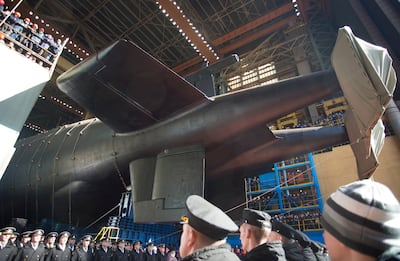Britain's critical undersea cable infrastructure needs an urgent defence upgrade with regular sightings of suspicious Russian activity in nearby waters and mysterious cable-cutting incidents posing severe threats.
A report from the Policy Exchange said thousands of miles of undersea fibre-optic cables, which are the "unseen arteries of global communication", are a "critical asset and a valuable target" as geopolitical tensions rise.
The report advocates for a ‘space-to-seabed’ strategic doctrine which will bring government and relevant private sector stakeholders together to protect Britain's undersea assets.
"Undersea cables are now as important to the international economy as open trade routes," said Michael Fallon, a former UK defence secretary.
"They underpin our financial systems, data exchanges and energy supplies. Britain’s economy and security are heavily dependent on its subsea connections with North America, Europe and the Middle and Far East.
"These are valuable targets for our global competitors: we have already seen Russian attempts to interfere with Atlantic cables.
"Countries like China are ahead of us in using sensors and unmanned vessels to protect their own networks. By sounding the alarm over our extreme vulnerability, this compelling report demands that the government urgently adopt a robust strategic response across multiple theatres.”

Middle East cable threat
The report points out the risk to undersea cables that exists in other areas of the globe as well, particularly in the Middle East.
"The proximity of the narrow and shallow waters to Iranian shores lays bare the extreme vulnerability of cables passing through this volatile region," it said.
"The Iran-backed Houthis' assault on global maritime shipping has already demonstrated the ease with which our adversaries can wreak havoc on the water’s surface; there are growing concerns that they might also start doing so below it."
The report claims the only factor holding Iran back from attacking undersea cables in its vicinity is the fact that it relies heavily on them. But should a war arise that threatens the regime's survival, internecine Iranian attacks on cables would "become entirely plausible."
Suspicious incidents
The Policy Exchange also points out that the vast areas involved in monitoring and protecting undersea cables necessitates a new and comprehensive strategy.
"As a belligerent Russia, and disruptive China and Iran, develop the capabilities to conduct subthreshold undersea warfare, the UK and its allies must not be caught flat-footed, and unable to deter and disrupt aggression against our critical maritime infrastructure along the seabed," the report said.
The Policy Exchange claims that in the past few years there have been eight unattributed yet suspicious cable-cutting incidents in the Atlantic, and more than 70 publicised sightings of Russian vessels behaving "abnormally near critical maritime infrastructure".
The report points to incidents of cable-cutting where Russian ships have been reported in the vicinity, such as near the Shetland Islands in 2022.

An expansion of the Royal Navy's Multi-Role Ocean Surveillance Ship (Mross) programme is seen as crucial. At the moment, the first of the UK's Mross programme’s two surface vessels, RFA Proteus, has yet to finish its operational training at sea. The Policy Exchange points out that many more vessels will be needed, "given the existence of multiple high-threat areas requiring constant monitoring in our waters and further afield".
In addition to expanding the Mross programme, the Policy Exchange is urging the government to deploy more sensors to monitor the undersea cables, as well as unmanned surveillance vessels.
In essence, the Policy Exchange is warning the government to take the issue of undersea cable vulnerability more seriously, because of the dire consequences for the UK's financial sector and economy in the event of a serious attack.
It's hoped the report will not fall on deaf ears: Prime Minister Rishi Sunak – then a back bench MP – contributed to a similar one seven years ago.
British strategic interests are tied up with the whole global undersea cable infrastructure, said Air Chief Marshal Lord Peach, former Chief of the Defence Staff and former Chairman of the Nato Military Committee.
“Regular sightings of suspicious Russian activity in nearby waters, mysterious cable-cutting incidents, and the growing concern amongst our friends and allies about undersea infrastructure vulnerabilities, all signal that we have arrived in a new era of undersea warfare," he added.


